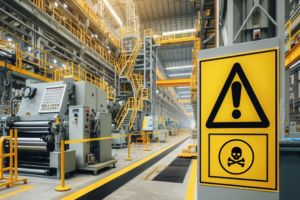Listeria outbreak shines spotlight on food safety
Listeria is a foodborne bacterium that is common in ready-to-eat foods that require no heating or cooking. This includes products such as pre-cooked meats, pâte, pre-packed sandwiches and pre-cut fruit.
The recent cases of deaths linked to listeria in the UK shine a spotlight on getting safety right when preparing food. The cases in the news involved three people who died after they consumed a dessert supplied to NHS hospitals and care homes.
The UK Health Security Agency (UKHSA) and the Food Standards Agency (FSA) are investigating cases where those affected had the same strain of listeria linked to a mousse-based pudding served in hospitals and care homes. In each case there were underlying immunocompromising health conditions in people aged between 68-89 years old.
So how does this impact your business? If you are a food producer or retailer you are responsible for properly vetting your suppliers. If an issue is identified, withdraw products as quickly as possible and inform the UKHSA.
If you are a business that handles, utilises, manufactures, processes or sells food you need to have a food management system which keeps your food products safe and ensures you comply with the legislation associated with food safety. If this is something you need help with, contact us today.
National Insurance increases: outsourced H&S can help
As employer NI increases are now in effect, don’t forget that outsourcing your health and safety to us is a solution to protect your business from these rises, as well as you, your staff and customers from work-based hazards.
We are a cost-effective, convenient way to comply with the law when you don’t have a dedicated person in-house. We are experts when it comes to health and safety, so you know you will be keeping your staff safe and allowing your core team to focus on your business.
Whether your firm needs help on a one-off basis or with a cost-effective retained package, we are the answer: the perfect one-stop-shop when it comes to health and safety for your SME. Contact us today to discuss your needs.
World Health Day
April 7th is World Health Day and what better time to consider how important it is to keep your staff healthy at work!
A large proportion of our lives is spent in the workplace, and it should not be a surprise that work therefore has a major bearing on our health. In the latest work-related ill health statistics from the Health and Safety Executive (HSE), 1.7 million workers in Great Britain are reported as having work-related ill health (Labour Force Survey (LFS)).
Two of the biggest causes of work-related ill health are occupational lung disease (OLD) and Musculoskeletal disorders. Let’s take a look.
In 2023/24 the LFS reported that 543,000 workers in Great Britain were suffering from either new or long-standing musculoskeletal disorders, with nearly 8 million working days lost due to these.
By industry, musculoskeletal disorders are most common in construction, transportation & storage, and administrative and support service activities.
The LFS reports that the main factors causing work-related musculoskeletal disorders come from:
- Manual handling
- Keyboard or repetitive work
- Working in awkward or tiring positions
You will recognise that these are generally common activities, and are all things that can be addressed with risk assessments, training (see below), and relatively simple mitigations.
What about occupational lung disease (OLD)? OLD is often serious and leads to premature mortality. In Great Britain there is an estimated 12,000 deaths a year (LFS) from OLD. Based on a three-year average between 2021-2024, the LFS reported that 47,000 people who worked in the last 12 months currently suffer from OLD. Whilst 139,000 people who have ever worked currently suffer from it.
Whilst the high number of OLD deaths each year is largely down to the effect of past working conditions (as they can often have a long dormancy period) it is paramount that you keep your staff safe now to reduce this number significantly in the future.
OLD is linked to the exposure of hazardous materials. It is your duty as an employer to assess and manage their risk.
Common hazardous substances include welding fumes, silica dust, wood dust, flour dust and asbestos.
Each workplace with hazardous substances will be affected by:
- The type of substance
- The working environment
- The work being carried out
It is your duty to carry out thorough risk assessments, and put control measures in place to eliminate or minimise the risk posed. This requires specialist input and as experts in health and safety we are here to help.
Whether its musculoskeletal disorders, occupational lung disease or any other issue which affects your staff health, we are here to support your business. Contact us today to discuss your needs to ensure your staff are kept healthy and safe.
Violence and aggression at work
Back in March, a viral video showed shoplifters in the USA dangling pythons in front of a cashier to distract them while stealing goods from their shop. Whilst this might be an out of the ordinary technique for stealing, there is an epidemic of shoplifting in the UK.
Now whether your business is in retail or another environment consider whether your staff have the correct training for dealing with aggression from the public.
The HSE defines work-related violence as ‘any incident in which a person is abused, threatened or assaulted in circumstances relating to their work.’
As an employer, the law mandates that you must carry out a risk assessment to identify risks to your staff and implement control measures to address these hazards. This includes the risk of violence and aggression in the workplace.
Another factor to be aware of as an employer is ensuring the safety of any lone workers in your workforce. Lone workers are those who work without any direct or close supervision and might include:
- Security staff
- Cleaners
- Delivery drivers
- Engineers
Whilst lone workers are not necessarily at a higher risk of violence or aggression, they are in a more vulnerable position should it occur. It may be beneficial for your staff to be trained in personal safety and violence prevention.
If your business requires training for lone working staff, input on a policy for lone working or help with a risk assessment to keep your staff safe from harm, get in touch today and we can help.
eLearning of the month: Manual handling training
As already mentioned, musculoskeletal disorders are one of the biggest causes of workplace ill-health, with manual-handling being a major factor.
We offer a manual handling training course as part of our eLearning provision. In just 35 minutes our course covers what you need to know about safe moving and handling.
Effective manual handling training can help make sure that the likelihood of injuries are reduced and helps keep your staff safe and healthy.
During the course, learners are taught the lifting technique LITE (Load, Individual, Task Environment) in order to assess how to conduct the manual handling most safely.
- Load: Consider the object being moved, is it heavy, bulky, unstable etc.
- Individual: Who is carrying out the manual handling? Are they capable? Do they need assistance?
- Task: Consider the activity itself. Does it require carrying, lowering, lifting etc. and how may it affect your safety?
- Environment: Where is the manual handling occurring? Is it safe? Is the floor wet or uneven? Are there trip hazards or space constraints? What safety risks are posed?
If this is an eLearning course that benefits your business then click here to find out more.






